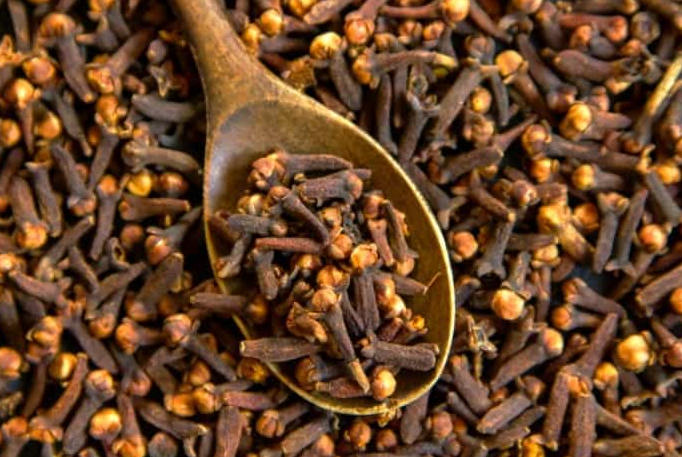Minerals and vitamins: One teaspoon of ground cloves contains 30 percent of the daily recommended amount of manganese, which is essential for bone health, and 4 percent of the recommended amount of vitamin C. Vitamin K and vitamin C are provided daily. Besides containing magnesium, calcium, and vitamin E, it is also a good source of fiber.

The antioxidant content of cloves is high. Because cloves contain phenolic compounds, they reduce oxidative stress, which may increase the risk of chronic diseases. Phenolic acids, for example.
Cloves’ benefits according to scientific studies
According to a preliminary study published in 2014 in the Journal of Medicinal Food, clove essential oil emulsion improved inflammation, blood and liver lipid levels, and oxidative stress in mice with fatty liver disease.
An animal study published in Cancer Prevention in 2014 found that cloves’ eugenol-rich part inhibited liver cell proliferation and reduced oxidative stress, thereby reducing cirrhosis risk. Cloves can also reduce the risk of liver disease by reducing oxidative stress, but high amounts of eugenol are toxic.
An early study in mice, published in the journal Natural Product Research in 2012, found that a hydroalcoholic extract of dried clove buds reduced the risk of osteoporosis caused by hypogonadism: however, cloves are rich in manganese, which plays an important role in bone formation and is vital for maintaining their health, although more research is needed to confirm this.
The benefits of cloves for diabetics
Using clove extract and the glycine contained in it, a preliminary study conducted on mice and published in the Journal of Medicinal Foods in 2017 was able to reduce insulin resistance and its symptoms. In diabetic rats, muscle cells’ ability to utilize glucose increases glucose tolerance, glucose-stimulated insulin secretion, and beta-cell function.
Cloves have stomach-friendly properties
An animal study conducted in 2011 showed that clove oil and its eugenol content reduce gastric ulcers and stimulate mucus production, which is vital for maintaining the stomach. People with ulcers benefit from a healthy stomach, but more studies are needed to confirm this.
Men’s benefits of cloves
Using a 50% ethanol extract of cloves on male rats in 2004 increased their sexual activity without causing stomach ulcers or negative side effects.
Cloves’ nutritional value
In 100 grams of ground cloves, the following nutrients are present:
| Nutrient | Nutritional Value |
| now | 9.87 ml |
| calories | 274 calories |
| carbohydrates | 65.53 grams |
| sugars | 2.38 grams |
| Dietary fiber | 33.9 grams |
| Protein | 5.97 grams |
| Fats | 13 grams |
| Calcium | 632 mg |
| iron | 11.83 mg |
| magnesium | 259 mg |
| phosphorus | 104 mg |
| potassium | 1020 mg |
| sodium | 277 mg |
| Zinc | 2.32 mg |
| copper | 0.368 mg |
| Manganese | 60.127 mg |
| Selenium | 7.2 mg |
| Vitamin C | 0.2 mg |
| Vitamin B1 | 0.158 mg |
| Vitamin B2 | 0.22 mg |
| Vitamin B3 | 1.56 mg |
| Vitamin B5 | 0.509 mg |
| Vitamin B6 | 0.391 mg |
| folate | 25 micrograms |
| Colleen | 37.4 mg |
| Vitamin A | 160 international units |
| beta carotene | 45 micrograms |
| Vitamin E | 8.82 mg |
| Vitamin K | 141.8 micrograms |
In small amounts, cloves are generally considered safe for most people, but large amounts may cause sensitivity and burning in the mouth, and dried cloves may cause sensitivity and burning. The use of clove oil on dental tissues, such as those of children, is often considered unsafe. Due to the possibility of severe side effects.
It is generally considered safe to eat cloves in small amounts during pregnancy and breastfeeding, but there is no information on the safety of large amounts. It is therefore preferable to avoid eating it during these two periods.
Contraindications to cloves
The following things should be avoided when using cloves:
People with bleeding disorders: Clove oil contains a chemical called eugenol, which is associated with bleeding disorders. Blood clotting may be slowed down by this medication.
During or after surgery, cloves’ eugenol can cause bleeding, so you should stop taking them at least two weeks before surgery.
Cloves and drug interactions
You should consult your doctor before eating cloves if you are taking anticoagulants and antiplatelet drugs simultaneously. There is a risk of bleeding and bruising associated with this. The reason for this is that it contains eugenol. Aspirin, warfarin, diclofenac, ibuprofen, naproxen, and diclofenac are some examples.
Liver damage caused by cloves
Clove oil can cause liver damage in children, which is why it is recommended not to give children any food or herbal supplements without consulting a doctor first.
How does clove oil benefit the body?
By distilling dried clove flower buds, clove oil is one of the essential oils extracted from the clove tree. Clove oil contains eugenol, which is an anesthetic and pain reliever. Additionally to being anti-inflammatory and anti-fungal, clove oil may also cause some of the damage mentioned above.
Can clove help you lose weight?
According to a 2017 preliminary study published in Food & Function, clove extract reduced the risk of obesity in rats, as well as weight, abdominal fat, and liver fat.
